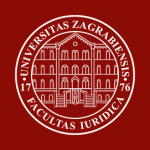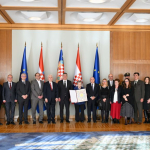Trg Republike Hrvatske 14
Zagreb, Croatia



Apart from borrowing and copying materials, the Library provides all other services online whenever possible.
For all types of inquiries, the Library can be contacted only by e-mail:
Borrowing materials and copying services are available at the address:
Trg Republike Hrvatske 3
Working hours: Monday – Friday 8 a.m. – 8 p.m.
To extend the due date for borrowed items, please use the e-mail: posudba.produzenje@pravo.hr
Reading room
The Reading Room of the Faculty of Law, situated in the Hall II on the ground floor on Trg Republike Hrvatske 3, is open for work and is equipped with twenty computers that enable access to national and foreign databases, and it offers a collection of study literature and selected periodicals. Apart from using computers to search legal sources, the students will also be able to print out various certificates.
The Reading room is open to all students, teachers and other interested users every working day from 9 a.m. to 6 p.m.
Library online services
The users can independently search the library holdings in the Library online catalogue at https://www.pravo.unizg.hr/knjiznica/online_katalog to check whether the Library has the requested title.
Searching the catalogue enables the user to get bibliographic information about library holdings. Send an e-mail to knjiznica@pravo.hr if you:
Other legal sources and full-text databases can be accessed from the library website under the e-source section https://www.pravo.unizg.hr/knjiznica/e-izvori (use your AAI identity to log in). Contact the Library by e-mail at knjiznica@pravo.hr if you:
Presentation of the Faculty of Law Library and its services
Details
About cookies
Necessary cookies 5
They are crucial for the use of the Internet site and without these sites it does not have its full functionality. By continuing to surf and make purchases, necessary cookies are considered accepted. Functional cookies may include cookies that provide a service requested by the user.
Pravni Fakultet 4
cookies_permission
To store the acceptance of cookies.
Expiry: 1 year
Type: HTTP
accessibility-text
To store text size accessibility options.
Expiry: 30 days
Type: HTTP
accessibility-contrast
To store options accessibility contrast page.
Expiry: 30 days
Type: HTTP
SimpleSAML
Site authentication
Expiry: 1 year
Type: HTTP
WordPress 1
wp-wpml_current_language
To store language settings.
Expiry: 1 day
Type: HTTP
Cookies for tracking and analytics 3
They are collected anonymously, they cannot track user activities on other websites and serve to monitor user behavior and for the purpose of measuring audience behavior and compiling reports for improving the website. These cookies enable the transfer of data to third countries, including the USA.
Pravni Fakultet 1
cookies_permission_analiza
To store the acceptance of analytical cookies.
Expiry: 1 year
Type: HTTP
Google 2
_ga
To store and count page views.
Expiry: 2 years
Type: HTTP
_ga_*
To store and count page views.
Expiry: 1 year
Type: HTTP
Cookies, also known as "cookies", are small text files that websites store on your device when you visit them.
Their role is to improve your browsing experience by allowing websites to remember your settings, such as language or preferences, and provide a better user experience.
These pages use different types of cookies. Some cookies are set by third-party services that are displayed on our pages.
You can change or withdraw your consent to the Cookie Statement on our website at any time.
EU legislation, in particular the General Data Protection Regulation (GDPR), requires users to obtain information and consent before using cookies and to be able to manage their privacy settings.
You can find more information about cookies here.
We use cookies to improve your user experience and site functionality. You can find more information about cookies here.



